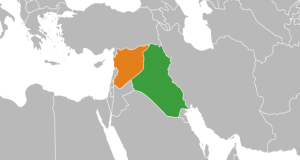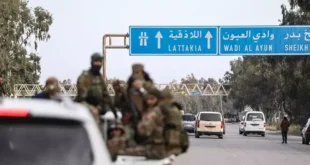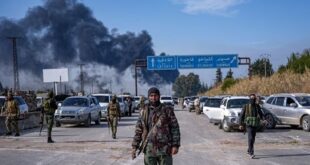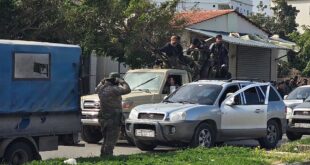Turkish troops surprised all and entered Iraq December 4 allegedly to protect Camp Zalkan in the Mosul province, where members of the ethnically diverse Nineveh Hashd are training. The Nineveh Hashd (or the National Mobilization) is a popular diverse militia trained by both Turkey and KRG Peshmerga of Iraq’s Kurdistan. It is meant to create a counter weight to the sectarian Popular Mobilization in the South almost exclusively led by the boys of Qassem Suleimani of the IRGC Quds Brigades.
The incursion was a kind of message to all concerned parties, particularly Tehran and Moscow that Ankara preserves the right to cross the border in case its security requires. It was also a reminder to the Kurdish PKK that Turkey will not shy away from going to Iraq in case Moscow assists the group to escalate its campaign against Turkish targets.
Previous arrangements between Turkey and the US agreed to enhance the role of the Peshmerga in order to counter the expansion of the PKK. Now, as the prospects of using the PKK by the Russians to revenge their downed jet is higher, the Turks wanted to remind all that it will not sit idle in face of any escalation by the PKK.
Russia’s reaction to Ankara’s surprising move was double folded. It warned the Turks no to do the same in Syria, and it focused the light on Iraq’s political groups’ invitation to Moscow to send forces to Iraq. Moscow considers Syria now a “protectorate” and the decision to go to Iraq is clearly a matter of time. It is when, not if. A Parliament committee in Baghdad issued an invitation to Putin already coupled with a recommendation to cancel all security arrangement with the US. Ankara, in its part, wants to preserve its stake in the battle of Mosul, which is currently under preparation.
Russia’s economic sanctions imposed on Turkey after the jet incident will have minor effects on Turkish economy. And Russia cannot stop natural gas shipments to Turkey for many reasons. This short reach of Moscow leaves Ankara a wider space to continue its security policies. This will certainly mean an increase in tension between the two countries and a parallel increase in polarization in Iraq and Syria.
The general lines of the Turkish policies in both Iraq and Syria have been set since the Incerlik Memorandum of Understanding (MoU) reached between the US and Turkey last August. The MoU, however, deliberately missed one central point for lack of agreement then. This point is a joint understanding of the role of the Syrian Democratic Party (PYD) with its militias called the PYD or the people’s protection committees. The reason then was that while Ankara considered the PYD too close to the PKK, Washington on the other hand was supportive of the Party’s effective fight against ISIL. The US was actively helping the PYD in its fight against the terrorist group.
For some time now, and as monitored on the ground, the direction of the winds was slowly changing. The new objective is to expand the role of the Peshmerga in both Iraq and Syria. Attempts to convince Saleh Muslim the head of Syria’s Kurdish PYD to reduce ties to the PKK were not particularly fruitful, or in more precise wording were not producing the required fast realignment. Under the rapidly moving developments, no one was willing to wait longer.
We mentioned in MEB few months back that there were high level meetings in Sulaymaniyah in Iraq between representatives of Syria’s PYD, Iraq’s Kurdistan Democratic Party (KDP) and Iran’s Revolutionary Guards (IRGC). These meetings took their course in time and they may have reached the point of a coordination with the Russians as well.
The sign of this is that there are strong signs on the ground indicating that the PYD received recent considerable shipments of Russian arms. Moscow’s will represent this as a support to the PYD anti-ISIL military activities in Hasaka. Yet, the whole situation has risen now to a level that transcends ISIL. It is a fight for who will control North of Syria and North of Iraq. Turkey’s position, and to a lesser extent Washington’s as well, is that Barzani’s Peshmerga should be introduced to the region more forcefully, yet there should be a way to keep the PYD’s fight against ISIL as effective as it is.
There is no easy way to solve this dilemma. Pressure is still being exerted on Saleh Muslim to his group with the Peshmerga and away from the PKK. The US considers the PKK a terrorist organization. Furthermore, ties between Russia and Iran on one hand and the Party on the other seem to be warming up. The two countries have traditionally strong old ties to the group.
We noticed, for example, that Muslim was not invited to Riyadh’s deliberation in preparation for the forming an opposition unified delegation to the proposed UN talks. The moderate Syrian opposition seems to be willing to welcome the Peshmerga in the North of Syria. Leaders of the Syrian Coalition visited Erbil recently and expressed the willingness of the moderate Syrian opposition to cooperate more openly with Barzani’s Peshmerga. Furthermore, the moderate Kurdish political organization in Kurdish regions in North Syria, The Kurdish National Council, which is close to Barzani, is building new bases of support among the Kurds there.
The PYD is ill-advised to stick with the PKK at this critical moment. The reason is that at one point its role will cease to be the most important in fighting ISIL. It cannot rely on a continuation of its situation today to imagine its role tomorrow. The Kurds fought for their rights. They will get these rights, not by the PYD or the PKK.
This whole picture has distinctive characters within its details. If indeed the conflict is moving to a proxy war that involves the US, the Turks, the Arabs and Barzani in one side and Iran, Iraqi Shia forces, Hezbollah, Assad and Russia in the other, the situation would have inched closer to a more dangerous point.
US (and the West in general) and Russia’s increasing involvement would be the direct reason for looking at the conflict differently. The Turks have a long experience, since the cold war, in being a front line state. But the difference now is obvious. There are Russian forces on its southern borders, Iranian forces on its eastern borders and Russia itself in the east. And there is the PKK within and cross its southern borders.
If the diplomatic effort fails, which is more likely than unlikely, everyone will understand that they are in it for the long haul. Few things should be said in that context:
A coalition will go as far as the degree of coherence and convergence which constitutes the substance of its base. Injecting this base with broader common objectives determines how far it will go. There must be, therefore, a clear understanding between all the potential partners on what this coalition seeks to achieve.
In the case of Syria, complex as it is, the above mentioned fragments of policies used up-to-date is clearer than in many other cases. Is it possible, in this particular case, to establish a coalition that merely goes as far as only defeating ISIL, while differing in all other individual objectives of its partner? It is possible. But as one applies a superficial concept to such a coalition one should expect superficial results. This applies to Ankara’s position on ISIL for one example. There are other examples as well. And this is what we see in the current “coalition”.
The US has to set a very clear agenda for such a coalition. The “coalition” we see now is a joke. It is created to help the administration spins its indecisiveness.
No one should be willing to put any considerable number of US forces on the ground. However, this should not be added to the Ten Commandments. It is not sacred. And after all, it should not be announced needlessly in every occasion.
A real coalition should be formed in a way that gets Arab, Turkish, Peshmerga and NATO trainers and Special Forces to join in implementing a plan based on the clear principles accepted in advance by all partners. These objectives should be based on creating a considerable Sunni force from the indigenous population, helped by others, to defeat ISIL and control central Iraq and East Syria as a first phase. The definition of control is based on clearing these regions from ISIL and having a Barzani-like moderate style leadership. The Kurds should control their traditional areas. No more. Then two federal states would come as a natural conclusion. If not, no Sunni attacks on Alawi or Shia regions in both countries should ever be permitted. This principle must be crystal clear to all, the Kurds, Turks, Arabs, Iraq’s Sunni Arabs and Syrian opposition.
The objective of this strategy must start always with building this Sunni forces in Iraq and Syria. There were some half steps and timid efforts that has already been done in this direction. But now, it must be a coordinated, well-studied full steam ahead. All efforts should focus on this particular objective as we believe that indeed it is a long term fight and it has been raised to the level of a grand strategic game between world powers. KRG should play a role in this through the effective example of the Peshmerga and its role on the ground.
If we ever reach this point, forming a well-trained, well-disciplined and effective Sunni forces in Central Iraq and East and North Syria, Sykes-Picot would have been redefined silently so to speak. If the Syrians and Iraqis value their respective “national” bond, they will find the way back to each other, and we will see a re-emergence of the national state in both on natural bases. If not, we will see what happens then. These forces should be built in full awareness of the possibility that they may deviate to undesirable objectives. Therefore, vigilant measures must be applied on every phase of the process of building their units.
The pro-Iran Iraqi Shia called loudly for a Russian role in kicking the small Turkish force that entered Iraq out. The cry among them is that it is a Turkish aggression against “national sovereignty”. One wonders about this moody national sovereignty that appeared now and is nowhere to be seen when Iranian forces move freely in Iraq. Did not they see Haj Qassem Suleimani with their Popular Mobilization hundreds of times? It reminds us with President Putin who wants a Syrian “secular” state to be built in alliance with the “Islamic” Republic of Iran.
The Shia Popular Mobilization forces built by Iranian agents and calling daily for a Russian role in Iraq are bluntly sectarian. They slaughter Sunnis because of their belief. The Shia militias in Syria are doing the same thing. Moscow supports this kind of “secular” forces. However, the Sunni armies proposed must confine their role to Sunni-land only. As much as possible, it should be free of any sectarian ideology. Sectarianism is the other face of the coin of extremism. It is based on religious identities hence it breeds extremism. What it should be based on is the objective of living in dignity and free on their own land.
 Geostrategic Media Political Commentary, Analysis, Security, Defense
Geostrategic Media Political Commentary, Analysis, Security, Defense





